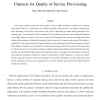Free Online Productivity Tools
i2Speak
i2Symbol
i2OCR
iTex2Img
iWeb2Print
iWeb2Shot
i2Type
iPdf2Split
iPdf2Merge
i2Bopomofo
i2Arabic
i2Style
i2Image
i2PDF
iLatex2Rtf
Sci2ools
121
click to vote
GLOBECOM
2009
IEEE
2009
IEEE
Effective Capacity Analysis of Cognitive Radio Channels for Quality of Service Provisioning
In this paper, cognitive transmission under quality of service (QoS) constraints is studied. In the cognitive radio channel model, it is assumed that the secondary transmitter sends the data at two different average power levels, depending on the activity of the primary users, which is determined by channel sensing performed by the secondary users. A state-transition model is constructed for this cognitive transmission channel. Statistical limitations on the buffer lengths are imposed to take into account the QoS constraints. The maximum throughput under these statistical QoS constraints is identified by finding the effective capacity of the cognitive radio channel. This analysis is conducted for fixed-power/fixed-rate, fixed-power/variable-rate, and variable-power/variable-rate transmission schemes under different assumptions on the availability of channel side information (CSI) at the transmitter. The impact upon the effective capacity of several system parameters, including channel...
Cognitive Radio Channel | Cognitive Transmission | Communications | GLOBECOM 2009 | QoS Constraints |
Related Content
| Added | 16 Aug 2010 |
| Updated | 16 Aug 2010 |
| Type | Conference |
| Year | 2009 |
| Where | GLOBECOM |
| Authors | Sami Akin, Mustafa Cenk Gursoy |
Comments (0)

